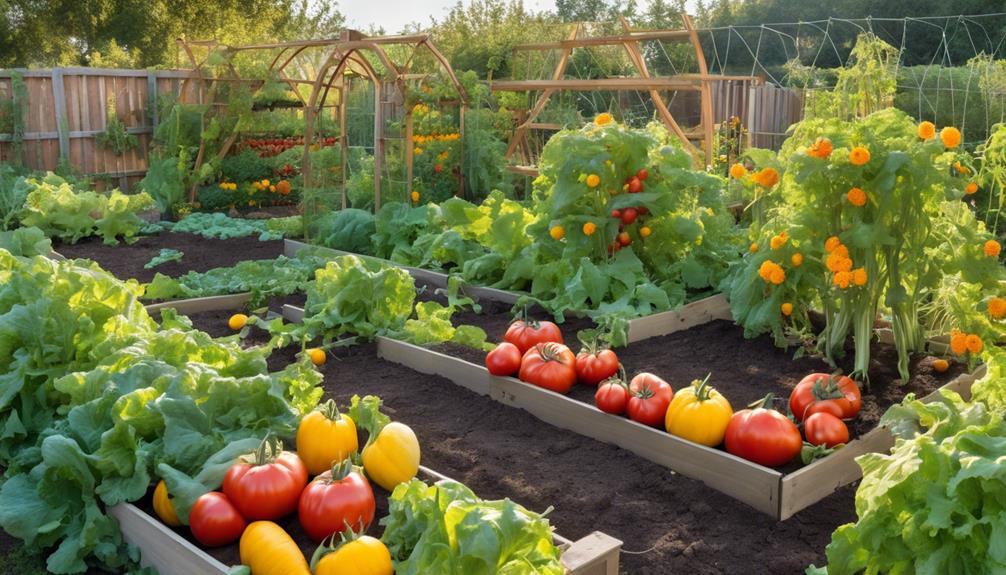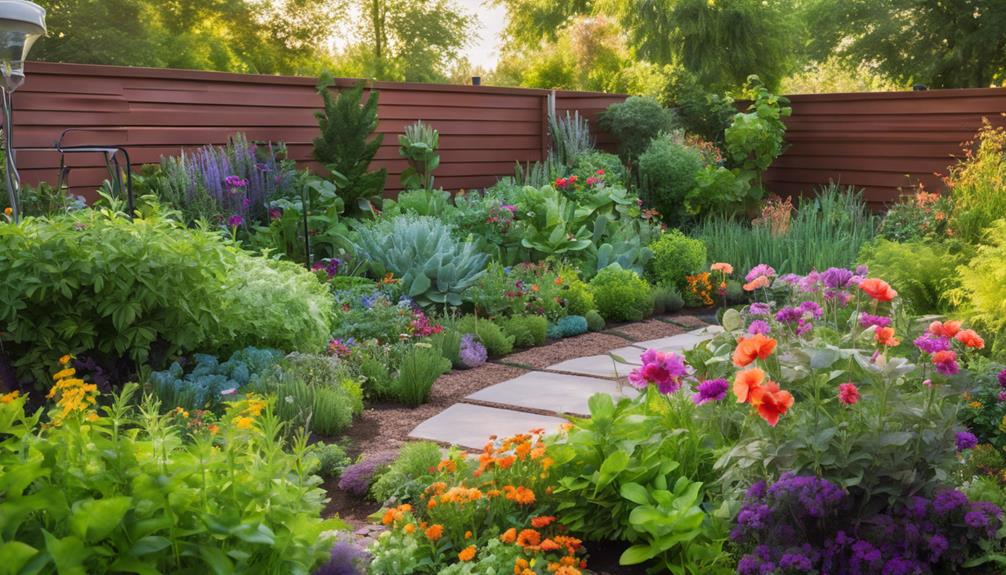
Why Hardscaping Maintenance Matters for Homeowners
10 March 2025
3 Best Therapeutic Garden Designs for Mental Wellness
10 March 2025Selecting the finest garden maintenance services for holiday homes is crucial for property upkeep and the health of your landscaping.
Seek out providers that offer seasonal planting, comprehensive pest control, and expert soil management. Services that emphasise organic fertilisation and efficient watering schedules can significantly enhance the vitality of your garden.
Moreover, a strong focus on aesthetic appeal can elevate the property's value. Regular maintenance ensures a flourishing outdoor space that complements your home.
For a detailed overview of the top ten services available, including specific offerings and benefits, further insights are provided.
Vacation Home Gardening Essentials
When managing a holiday home garden, having the right tools is vital for efficient maintenance.
An essential tools checklist ensures that homeowners are equipped to tackle various gardening tasks, while understanding seasonal maintenance priorities aids in keeping the landscape thriving throughout the year.
Essential Tools Checklist
What tools are indispensable for maintaining a flourishing garden at your holiday home? A well-curated toolkit is vital for optimal garden care.
Start with a high-quality pair of pruning shears for precise cuts and plant health. A sturdy trowel is essential for planting and transplanting, while a hand rake assists in managing soil and debris.
In addition, consider a durable hose with an adjustable nozzle to ensure adequate watering. A garden fork is invaluable for aerating soil, and gloves protect your hands from thorns and irritants.
For larger tasks, a reliable wheelbarrow facilitates the transport of soil, mulch, or plants. Ultimately, a soil moisture meter aids in precise watering decisions, ensuring your garden thrives even during your absence.
Seasonal Maintenance Priorities
Effective garden maintenance at a holiday home requires careful attention to seasonal priorities to ensure the landscape remains vibrant and healthy throughout the year.
In spring, initiate rejuvenation by pruning dormant plants, applying fertilisers, and preparing beds for planting.
Summer demands regular watering, mulching to retain moisture, and vigilant weed control to secure ideal growth.
As autumn arrives, focus on leaf removal, soil enrichment, and the protection of delicate perennials against frost.
Winter maintenance should include evaluating drainage systems, protecting vulnerable species, and planning for the upcoming season.
Each season presents distinct challenges and opportunities; therefore, a strategic approach tailored to the unique climate and landscape of your holiday home will ensure lasting beauty and sustainability in your garden.
Seasonal Planting Considerations
When planning seasonal planting for holiday homes, it is vital to evaluate soil quality to ensure ideal growth conditions.
Moreover, establishing a tailored watering schedule can greatly improve plant health, particularly in varying climates.
Soil Quality Assessment
How can a thorough soil quality evaluation improve the success of seasonal planting in holiday homes? An accurate analysis of soil composition and health lays the foundation for flourishing gardens.
Key benefits include:
- Nutrient Optimisation: Identifying nutrient deficiencies allows for targeted amendments, promoting vigorous plant growth.
- pH Balance: Understanding soil pH facilitates the selection of compatible plants, enhancing their vitality.
- Soil Texture Analysis: Evaluating texture aids in assessing drainage and aeration capabilities, critical for root development.
- Biological Activity Evaluation: Measuring microbial activity provides insights into soil health, fostering an environment conducive to thriving plants.
Watering Schedule Optimization
A well-structured watering schedule is essential for the success of seasonal planting in holiday homes, ensuring that plants receive the right amount of moisture at the appropriate times.
To optimise your watering schedule, consider the following factors:
- Plant Type: Different species have unique moisture needs; research accordingly.
- Seasonal Changes: Adjust watering frequency based on rainfall and temperature variations throughout the year.
- Soil Quality: Assess soil drainage and retention capabilities to prevent overwatering or drought stress.
- Time of Day: Water early in the morning or late in the evening to minimise evaporation losses.
Pest Control Strategies
Effective pest control strategies are crucial for maintaining the health of seasonal plantings in holiday homes. A proactive approach helps mitigate damage from pests while ensuring vibrant gardens.
Here are key strategies to take into account:
- Regular Monitoring: Inspect plants frequently for signs of pest activity, enabling timely intervention.
- Beneficial Insects: Introduce natural predators such as ladybirds and lacewings to manage pest populations sustainably.
- Companion Planting: Utilise plants that repel pests, such as marigolds alongside vegetables, to create a natural barrier.
- Cultural Practices: Implement crop rotation and proper sanitation to disrupt pest life cycles and reduce infestations.
Create a Maintenance Schedule
Establishing a maintenance schedule for your holiday home's garden begins with an initial site assessment to identify specific needs and challenges.
Incorporating practices such as mulching for moisture retention and soil aeration techniques can greatly improve plant health and resilience.
A well-structured schedule ensures that these crucial tasks are carried out in a timely manner, promoting a thriving outdoor environment.
Initial Site Assessment
Conducting an initial site assessment is crucial for creating an effective maintenance schedule for holiday homes. This assessment lays the groundwork for identifying specific needs and scheduling appropriate services.
A thorough evaluation should encompass the following key areas:
- Soil Quality: Analyse pH levels and nutrient content to ensure ideal plant health.
- Plant Condition: Assess the health and diversity of existing flora to pinpoint required care.
- Irrigation Systems: Examine existing watering mechanisms for efficiency and effectiveness.
- Pest and Disease Inspection: Identify any signs of infestation or disease that may affect the garden's importance.
Mulching for Moisture Retention
Implementing a strategic mulching plan is crucial for maintaining moisture levels in the gardens of holiday homes. Effective mulching not only conserves water but also improves soil health and reduces weed competition.
To achieve optimal results, consider the following schedule:
- Select your mulch: Choose organic materials such as wood chips, straw, or shredded leaves based on aesthetics and nutrient requirements.
- Application timing: Apply mulch in early spring or autumn to optimise moisture retention during dry spells.
- Depth matters: Maintain a mulch layer of 5-10 cm to effectively suppress weeds and regulate soil temperature.
- Routine maintenance: Replenish mulch annually to ensure lasting moisture retention and soil enrichment.
Soil Aeration Techniques
Soil aeration is an essential practice for ensuring the health and vigour of garden beds in holiday homes. Proper aeration enhances root development, improves water drainage, and facilitates nutrient absorption.
To effectively incorporate soil aeration into your maintenance schedule, consider the following techniques:
- Core Aeration: Utilise a core aerator to remove plugs of soil, allowing air and nutrients to penetrate.
- Spike Aeration: Employ a spike aerator to create holes in the soil, improving airflow.
- Seasonal Timing: Aerate during the growing season, ideally in spring or autumn, when soil moisture is optimal.
- Frequency: Aim for aeration once or twice annually, depending on soil compaction levels and plant health.
Implementing these techniques will greatly enhance your garden's vitality.
Enhanced Property Value
Investing in garden maintenance services greatly contributes to enhanced property value for holiday homes. A well-maintained garden not only improves aesthetic appeal but also reflects the homeowner's commitment to quality. Potential buyers are often drawn to properties with vibrant landscapes, as these can signify lower future maintenance costs and a more enjoyable living experience.
| Benefit | Impact on Property Value |
|---|---|
| Curb Appeal | Increases buyer interest |
| Healthy Landscaping | Reduces maintenance concerns |
| Seasonal Colour & Variety | Improves overall attractiveness |
Ultimately, a professionally maintained garden can yield a significant return on investment, making it a vital aspect of holiday home management. By prioritising maintenance, owners can create inviting environments that attract discerning buyers.
Organic Fertilizer Usage
The usage of organic fertiliser is crucial for maintaining healthy gardens in holiday homes, contributing to both plant vigour and sustainability.
Techniques such as compost tea application, organic soil amendment methods, and the use of worm castings can greatly improve soil quality and promote robust growth.
Compost Tea Application
Regularly applying compost tea to the gardens of holiday homes can greatly improve soil health and plant vigour. This organic fertiliser boosts nutrient availability and microbial activity, fostering an ideal growing environment.
To master the application of compost tea, consider the following key points:
- Dilution Ratio: Mix one part compost tea with 10 parts water for effective nutrient absorption.
- Application Timing: Apply during early morning or late afternoon to minimise evaporation and optimise absorption.
- Method of Application: Utilise a sprayer or watering can to evenly distribute the tea across the soil and foliage.
- Frequency: Apply every 2-4 weeks during the growing season for sustained benefits.
Organic Soil Amendment Techniques
Improving garden health in holiday homes often relies on effective organic soil amendment techniques, which play a crucial role in enhancing soil fertility and structure.
Employing organic fertilisers not only nourishes plants but also enriches the soil ecosystem. To master organic soil amendment, consider the following techniques:
- Composted Manure: Provides essential nutrients while improving soil texture.
- Green Manures/Cover Crops: Boost soil nitrogen levels and prevent erosion.
- Bone Meal: A phosphorus source that promotes root development and flowering.
- Fish Emulsion: A quick-release fertiliser rich in nitrogen, ideal for leafy plants.
Utilising these organic amendments will ensure that your garden thrives, producing vibrant plants in a sustainable manner.
Worm Castings for Soil Enrichment
A remarkable way to enrich garden soil is through the use of worm castings, which are considered one of the most effective organic fertilisers available.
These nutrient-rich by-products of earthworm digestion offer numerous benefits for plant health and soil structure.
Here are four key advantages of incorporating worm castings:
- Nutrient Density: Packed with vital nutrients and trace elements, promoting robust plant growth.
- Microbial Activity: Boosts beneficial microorganisms, fostering a healthy soil ecosystem.
- Moisture Retention: Improves soil structure, allowing for better water retention and drainage.
- pH Neutralisation: Helps balance soil pH levels, creating an ideal environment for diverse plant species.
Utilising worm castings can greatly elevate the quality and productivity of garden soils, ensuring vibrant growth in your holiday home's landscape.
Pest Infestation Management Strategies
Effective pest infestation management is essential for maintaining the health of gardens in holiday homes.
Employing regular pruning techniques, adjusting irrigation systems, and utilising an integrated pest management approach can considerably reduce pest populations and protect plant health.
Regular Pruning Techniques
Regular pruning techniques play a crucial role in managing pest infestations in holiday homes. By maintaining plant health through strategic pruning, you can significantly reduce the likelihood of pest-related issues.
Effective pruning not only enhances aesthetics but also ensures adequate air circulation and sunlight penetration, which are essential for plant vitality. Here are four key pruning strategies:
- Remove Dead or Diseased Wood: Eliminate any compromised branches to prevent pests from nesting and spreading.
- Thin Dense Growth: Create space between branches to improve airflow and reduce humidity, discouraging pest proliferation.
- Cut Back Overgrown Plants: Regularly trim to maintain manageable sizes and minimise hiding spots for pests.
- Prune During Dormancy: Timing your pruning to the dormant season can reduce stress on plants and deter pests.
Implementing these techniques can cultivate a robust garden environment.
Irrigation System Adjustment
Proper irrigation system adjustment is essential for maintaining a healthy garden ecosystem in holiday homes, particularly in managing pest infestations.
An efficient irrigation system minimises excess moisture, reducing the likelihood of pest proliferation. To master irrigation adjustments, consider the following strategies:
- Assess Soil Moisture: Regularly check soil moisture levels to avoid over-watering, which can attract pests.
- Monitor Watering Schedule: Adjust the frequency and duration of watering based on seasonal changes and plant needs.
- Utilise Drip Irrigation: Implement drip systems for targeted watering, limiting water exposure to foliage where pests thrive.
- Inspect for Leaks: Regularly examine the system for leaks, as stagnant water can create a breeding ground for pests.
Integrated Pest Management Approach
Maintaining a healthy garden in holiday homes necessitates a proactive approach to pest management, particularly following adjustments to irrigation systems.
An Integrated Pest Management (IPM) approach combines diverse strategies to effectively minimise pest populations.
Here are four crucial components of IPM:
- Monitoring: Regularly inspect plants to identify pests and assess their impact.
- Identification: Correctly classify pests to apply targeted control measures.
- Prevention: Implement cultural practices, such as crop rotation and maintaining healthy soil, to deter infestations.
- Control: Utilise a combination of biological, mechanical, and chemical methods, applying the least harmful options initially.
Why Choose TKL Birmingham Gardener
Choosing TKL Birmingham Gardener for your holiday home ensures that your outdoor spaces are not only well-maintained but also flourish throughout the seasons.
With a team of experienced horticulturalists and landscape professionals, TKL offers bespoke gardening solutions tailored to your property's unique requirements. Their expertise encompasses everything from soil health assessments to the implementation of sustainable practices, ensuring your garden thrives while promoting ecological harmony.
TKL's commitment to excellence is evident in their meticulous attention to detail and proactive maintenance schedules, which keep your landscape vibrant and inviting.
Furthermore, their transparent communication and customer-focused approach foster a strong partnership, allowing you to enjoy your holiday home with confidence that your garden is in the best hands.
Experience the TKL difference for unparalleled garden care.
Common Gardening Questions Answered
Many homeowners have questions about gardening that can significantly impact the health and aesthetics of their outdoor spaces. One common inquiry pertains to soil health; understanding soil composition and pH is essential for optimal plant growth.
Moreover, many wonder about the best time to plant different species; seasonal timing can greatly influence plant vigour. Pest management is another frequent concern; employing integrated pest management strategies can mitigate infestations while safeguarding beneficial organisms.
In addition, homeowners often seek advice on irrigation techniques to ensure efficient water usage. Finally, understanding the importance of pruning and deadheading can enhance flowering and overall plant health.
Addressing these questions empowers homeowners to cultivate thriving gardens that reflect their personal style and commitment to sustainability.
Final Maintenance Checklist
Completing a final maintenance checklist is crucial for ensuring that holiday homes maintain their gardens in ideal condition throughout the off-season.
A well-executed checklist helps in preventing potential issues and preserving the aesthetic appeal of the landscape.
Here are key tasks to prioritise:
- Pruning and Trimming: Shape shrubs and trees to promote healthy growth and improve appearance.
- Weed Control: Remove any invasive species to prevent competition for nutrients.
- Mulching: Apply a fresh layer of mulch to retain moisture and regulate soil temperature.
- Irrigation Inspection: Check and winterise irrigation systems to avoid damage during colder months.




